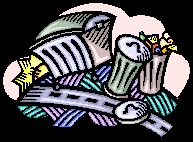You want to know how the economy is doing, track trashy
facts. Driving home from a meeting at the Institute
for Entrepreneurship at Colorado State University I flipped on the radio to
Marketplace
from American Public Media and heard this story about tracking trash. This guy
was explaining that when he was a graduate student he was studying anthropology. One thing he learned was that you can find out a lot about societies by studying
their trash. What he didn’t know at the
time was that he would later in life discover a correlation between the volume
of trash and the strength of the economy. When the economy is going strong we get
rid of more stuff (there’s an obvious social commentary in there, but I will
leave that to some other pundit). Turns out, right now, we are not dumping so
much trash.
OK, so what is an HR Innovation blogger doing writing about
trashy economic indicators. Well, here’s the thing. This is a big data story.
All this information about trash: how much is shipped, what kind of trash it
is, how many tons are discarded and who’s discarding it is all compiled and
kept in multiple, unrelated, obscure data bases. Someone had to find, compile
analyze and interpret all this data to find the patterns that represented
useful information. The same sort of anthropological expedition is there for HR
professionals as well.
Earlier this month I wrote a blog post titled “Big
Data Should Be a Big Deal for HR.” All this trash talk got me thinking
about big data some more. So much information is collected in so many different
places. Companies collect terabytes of data about their employees; social and
professional media adds even more, so do our schools, our volunteer
organizations, our churches, our governments, our local PTA. They all have records
about people. Some of this data means very little and is
perfectly content to be obscure. Other information is a gold mine that provides
useful information about who we are, what we do, what we like to do. In other
words: Human Resource Information.
The problem (or challenge) that confronts us is how do you
dig through all the trash (OK – I know I am overdoing the analogy) to find what
is really meaningful. But it is going to happen. Technical tools are being
developed and researchers are being busy to help discover ways to find these deposits
of data and figure out how to mash them together to find new patterns and new
uses of the information. HR professionals sit largely on the sidelines of this
frontier. It’s a shame; it will be one of the biggest trends that change HR in
the next decade.

No comments:
Post a Comment